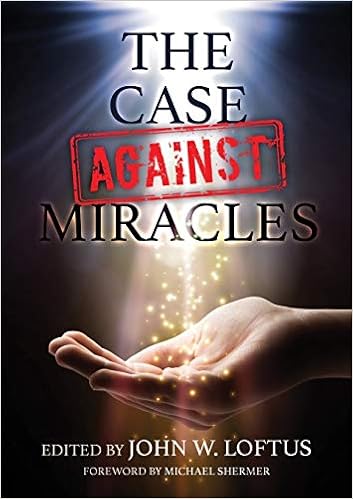
[The famous Scottish philosopher, David] Hume argues that there isn’t to be found “in all history, any miracle attested by a sufficient number of men, who are of unquestioned good sense, education, and learning as to secure us against all delusion in themselves; of such undoubted integrity, as to place them beyond all suspicion of any design to deceive others…and at the same time attesting facts performed in such a public manner and in so celebrated a part of the world, as to render the detection unavoidable.”
Christian apologist Michael Licona objects: “If Hume’s criteria for accepting testimony as true were employed outside of miracle claims, we would probably have to dismiss the vast majority of what we believe we presently know about the past. Much of what we hold about the past was reported by a lone source and it is rarely ‘beyond all suspicion.'”

The ingenuity of Christian apologists to exploit good arguments in reverse never ceases to surprise me. Licona fails to understand the difference between the evidential requirements for ordinary claims from extraordinary miraculous claims. Ordinary claims about ordinary events can usually be taken at face value. But that doesn’t mean we have to leave it there. Ordinary claims having ordinary evidence are backed up by a whole boat load of objective evidence presumed to be there if we were to check. If a close friends said she took an Amtrak Wolverine train ride from Detroit to Chicago and is considered trustworthy, there’s no reason to require any objective evidence proving she did. But it exists just as surely as a boat load of evidence exists showing she is trustworthy. Perhaps it would be a train ticket itself, or a surveillance camera on the train, or the selfie she took with a person she met on the way. This is the kind of sufficient objective evidence required when it comes to any claim. It’s just that we don’t need to require it when it comes to ordinary claims, whereas, we must insist on sufficient objective evidence in addition to one’s testimony when it comes to miracle claims that defy nature. —John Loftus, The Case Against Miracles, pp. 94-95
Gary: Why is this simple concept so difficult for most conservative Christian apologists to understand? If I tell you that I had a phone conversation with my dad yesterday you most likely will not demand that I provide evidence of the conversation to believe me. You will take my word for it. However, if I claim that I had a phone conversation with Abraham Lincoln yesterday, my word is not going to be sufficient. Ordinary claims require ordinary evidence. Extra-ordinary claims require extra-ordinary evidence…unless it involves claims for your religion or favorite superstition.
Modern, educated people should not think so irrationally.
End of post.
I often find this one of the most frustrating parts of trying to converse with believers about their religious beliefs. It’s unfortunate that so many people have been duped by religious apologists – apologists who really only care about finding inventive ways to justify their religious presuppositions.
The fact remains that we don’t have any event that we can say is actually a verified miracle. I reckon that’s a massive problem for believers.
LikeLiked by 1 person